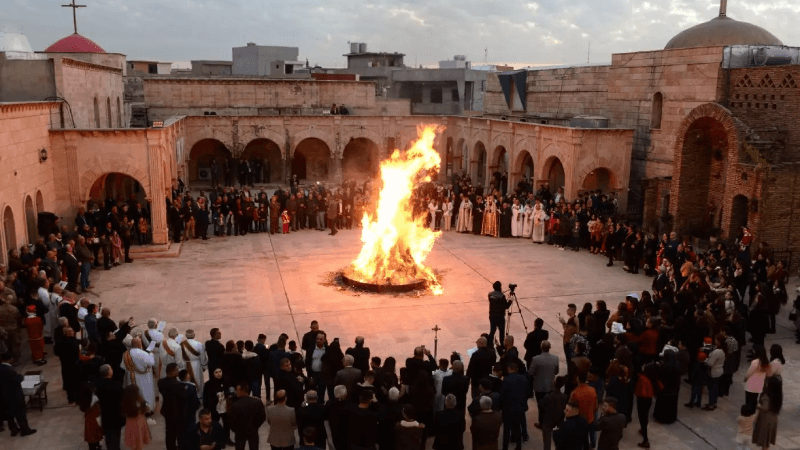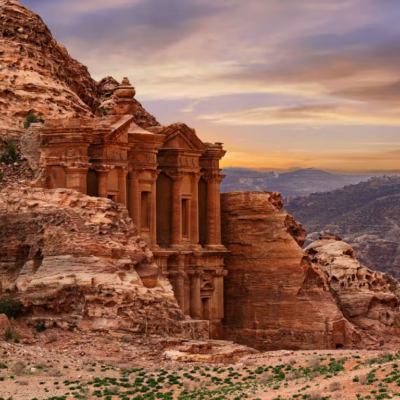What are Christmas Traditions in the Arab World?

Christian communities in the Middle East are among the oldest in the world, tracing their origins back over two millennia to the early days of the faith in modern-day Palestine, Israel, and Syria. In regions such as Iraq and Syria, some Christians continue to speak Aramaic dialects—the language believed to have been spoken by Jesus Christ.
Egypt is home to the largest Christian population in the Middle East, with Christians comprising 10 to 20 percent of its populace, numbering up to 20 million. The majority are members of the Coptic Orthodox Church, but Egypt is also home to a diverse range of denominations, including Catholics, Greek Orthodox, and Protestants.
This diversity translates to a variety of ways to celebrate Christmas, influenced by both religious calendars and local customs. For instance, while many follow the Gregorian calendar and mark Christmas on December 25, the Coptic Church celebrates the occasion on January 7.
In Lebanon, festive celebrations known as “Eid Milad Majid” are filled with joy and grandeur, while in Iraq and Syria, quieter family gatherings mark the occasion. Despite their differences, Middle Eastern Christians share deep-rooted traditions that reflect their faith and culture.
Christmas Camels in Syria: A Unique Festive Symbol
In Syria, the figure of Santa Claus is replaced by a Christmas camel, reflecting the region’s historical and cultural ties. According to tradition, camels carried the three wise men to Bethlehem, where baby Jesus blessed the animals with eternal life. Today, the camel plays the role of gift-bringer, ensuring well-behaved children receive presents.
On Christmas Eve, children prepare for the camel’s arrival by filling their shoes with hay and setting out bowls of water. This tradition intertwines with Syrian Christianity’s ancient roots, dating back to the Apostle Paul’s epiphany on the road to Damascus.
Eastern Orthodox Christians in Syria observe a 40- to 43-day fast before Christmas, abstaining from dairy, meat, eggs, and fish. They break their fast on Christmas Eve with a feast of traditional Levantine dishes, celebrating the occasion with loved ones.
Iraq: Bonfires and Fortune-Telling Ashes
In Iraq, one of the world’s oldest Christian communities, Christmas traditions are steeped in history. A significant ritual involves lighting a bonfire of thorny branches after children recite the nativity story by candlelight. If the thorns burn completely to ash, it is seen as a sign of good fortune for the year ahead.
As the flames die, family members jump over the ashes three times, making wishes for the future. Iraqis also enjoy “klecha,” date-filled biscuits exchanged during the festive period. Despite the challenges faced by Iraq’s Christian community, these traditions continue to bring hope and unity.
Jordan: A Festive Fruitcake Steeped in Tradition
In Jordan, home to biblical landmarks like Mount Nebo, Christmas traditions are marked by the preparation of a rich fruit cake infused with alcohol or local spirits such as arak. This sticky, spiced cake is prepared weeks in advance, with ingredients added incrementally until it is baked in time for Christmas Eve.
Jordan’s Christian population, primarily Eastern Orthodox, celebrates with a blend of religious observance and cultural festivities, making the season both spiritual and joyous.
Sprouting Pulses in Lebanon: A Symbol of Life and Birth
Christmas in Lebanon is a grand affair, with streets and homes illuminated by elaborate decorations. A unique tradition involves sprouting pulses such as chickpeas, lentils, and beans on damp cotton two weeks before Christmas. These green shoots, symbolizing birth and life, adorn nativity scenes and altars.
Lebanese Christmas feasts often feature “kibbeh bil sayinyyeh,” a baked lamb and bulgur dish, alongside spiced rice-stuffed turkey. Desserts like “meghli,” a cinnamon and anise-flavored rice pudding, round out the festive meal.
Bethlehem: The Heart of Christmas in Palestine
In Bethlehem, the birthplace of Jesus, Christmas is celebrated with vibrant parades and solemn church services. The annual Christmas parade, featuring local scout groups playing instruments, winds through the streets on Christmas Eve, culminating in a midnight service at the Church of the Nativity.
Visitors from around the world flock to Bethlehem during the season to witness these celebrations. Traditional Palestinian Christmas meals include “qedreh,” a rice and lamb dish, and “sahlab,” a hot rose-water drink served with sweet treats like “qatayef.”
Egypt: Fasting and Feasting with Fattah
Egypt’s Coptic Christians observe a 43-day fast before Christmas, adhering to a vegan diet in preparation for the Nativity Feast. On January 7, the fast is broken with festive dishes like “fattah,” a layered bread and rice dish soaked in lamb broth and topped with garlic-vinegar sauce.
St. Mark’s Cathedral in Cairo becomes a hub of activity during Christmas Eve Mass, as the faithful gather to celebrate their unique traditions, reflecting the enduring spirit of Egypt’s Christian community.
A Mosaic of Faith and Festivity
Christmas in the Middle East is a vibrant mosaic of traditions, blending faith, history, and culture. From bonfires in Iraq to sprouting pulses in Lebanon, each custom tells a story of resilience and devotion, offering a glimpse into the rich heritage of the region’s Christian communities.




